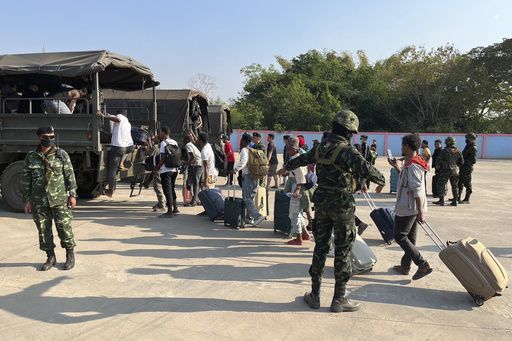BANGKOK — Approximately 260 individuals who were reportedly victims of human trafficking and forced to work in online scam operations are set to be repatriated following their rescue from Myanmar, according to an announcement made by the Thai military on Thursday.
As part of an ongoing campaign against these illegal scam operations in Southeast Asia, the Thai army has stated that they are facilitating the return of these individuals who were brought to Thailand after being rescued from Myanmar.
Southeast Asian countries, particularly Myanmar, Cambodia, and Laos, have become known as hotspots for criminal syndicates. These groups are estimated to have coerced hundreds of thousands of individuals across the region into participating in various online scams, including those related to false romance, fraudulent investments, and illegal gambling.
The scale of these scams has reportedly led to losses amounting to tens of billions of dollars globally, as outlined by analysts at the U.N. Many of those drawn into these schemes have often been misled about the nature of the jobs and have found themselves ensnared in conditions akin to virtual slavery.
An earlier initiative targeting scam operations in Myanmar was launched at the end of 2023 after Chinese authorities expressed concerns regarding illegal casinos and fraudulent businesses operating along its border with Myanmar’s Shan state. As a result, various ethnic guerrilla factions with connections to China shut down many of these operations, leading to the repatriation of around 45,000 Chinese individuals thought to be involved.
The recent rescue effort yielded victims from 20 different countries, with notable numbers originating from Ethiopia, Kenya, the Philippines, Malaysia, Pakistan, and China. Other nationalities included those from Indonesia, Nepal, Taiwan, Uganda, Laos, Brazil, Burundi, Tanzania, Bangladesh, Cambodia, Sri Lanka, Nigeria, Ghana, and India. The group was transported from Myanmar’s Myawaddy district into Thailand’s Tak province on Wednesday.
Thai media reports suggest that the Democratic Karen Benevolent Army, an ethnic militia controlling the region where the captives were held, played a key role in their liberation and subsequent transfer to the border. The junta-driven government in Myanmar has limited control in areas where ethnic minorities reside.
Many of these ethnic militias are believed to engage in various unlawful activities, including drug trafficking and facilitating call-center scams.
According to the Thai army, individuals who were rescued will be interrogated, and those identified as victims of human trafficking will enter a protective custody process while they await repatriation.
Deputy Prime Minister and Defense Minister Phumtham Wechayachai indicated that there may be additional scam victims in Myanmar looking to return through Thailand; however, the country will only expedite the return of those who are immediately ready to go home.
“I’ve made it clear that Thailand is not going to set up another shelter,” he stated in a press briefing while visiting Sa Kaeo province, which borders Cambodia. Thailand currently operates nine refugee camps that house over 100,000 individuals, predominantly from Myanmar’s ethnic Karen community.
Phumtham emphasized the importance of questioning the rescued individuals before their return to ensure they are legitimate victims of trafficking and to gather information to aid police investigations into these criminal activities.
During a trip to China in early February, Thailand’s Prime Minister Paetongtarn Shinawatra, along with Chinese President Xi Jinping, pledged to combat the scam networks troubling Southeast Asia.
Numerous alarming accounts have emerged of Chinese citizens lured with promises of work in Bangkok, only to find themselves trafficked into scam operations in Myanmar. One notable case involved Chinese actor Wang Xing, who gained attention on social media and was swiftly rescued.
Emphasizing China’s worries, Liu Zhongyi, Vice Minister of Public Security in China, visited Thailand last month to inspect the border regions adjacent to Myanmar’s scam centers.
Prior to Paetongtarn’s visit to China, the Thai government enacted a directive to sever electricity, internet, and gas supplies to specific areas in Myanmar located along the northern Thai border, citing national security and the extensive damage incurred from scam activities. Thai defense ministry spokesperson Thanathip Sawangsang stated that further measures might be considered for Thailand’s northeastern regions bordering Cambodia, and indicated that illegal internet cables had already been removed from those areas.


